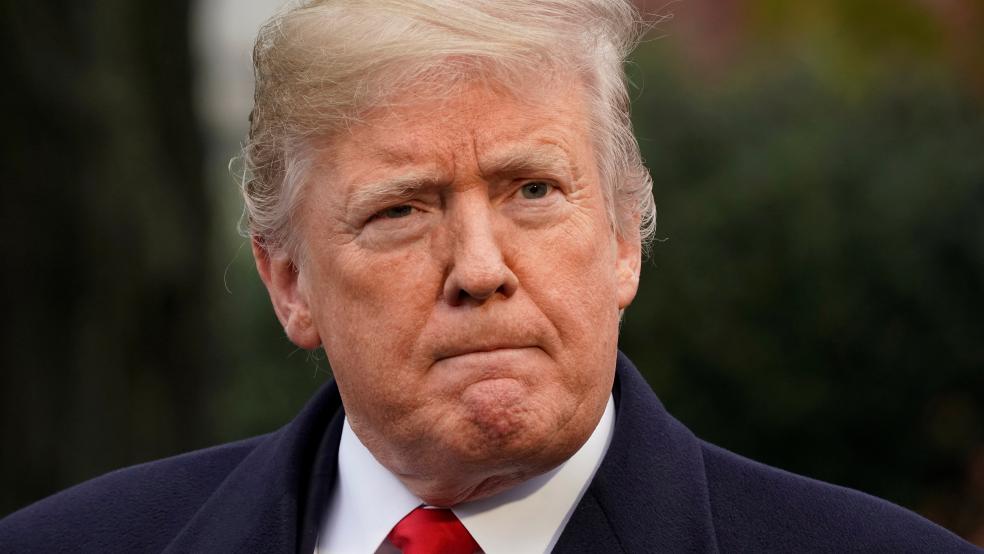President Trump is demanding that his advisers come up with a plan to reduce the deficit, The Washington Post’s Josh Dawsey and Damian Paletta report. Oh, and President Trump is also pushing new spending measures on infrastructure, a border wall with Mexico and an additional tax cut for the middle class while nixing the possibility of tax increases or substantial cuts to the defense budget, Social Security and Medicare.
“In other words, the president isn’t actually serious about tackling the deficit,” writes the Post’s Tory Newmyer. “The red ink exploding on his watch has spooked the president — just not enough to force the sort of hard choices that will rein it in.”
The background: The deficit for fiscal 2018, Trump’s first full year in office, rose 17 percent to $779 billion, the Treasury Department said last month. The Committee for a Responsible Federal Budget estimated that Trump’s signature tax cuts added $164 billion to that sum, while a bipartisan spending deal contributed $68 billion more — and that legislation enacted in fiscal 2018 would add $445 billion to the 2019 deficit, or nearly half of the projected total. Trump then ordered his Cabinet to cut spending at departments and agencies by 5 percent — though he suggested more modest cuts to the defense budget. Budget watchers noted that Trump’s proposed cuts wouldn’t actually rein in the rising deficit.
“In total, government debt has risen roughly $2 trillion since Trump took office, and the federal government now owes $21.7 trillion, according to the Treasury Department,” Dawsey and Paletta write. “The president’s agenda has contributed to that increase and is projected to continue to do so, both through the GOP tax cut and with bipartisan spending increases.” The U.S. Treasury projects it will issue $1.3 trillion in new debt this calendar year, more than twice last year’s level.
The budget math: The U.S. government spent $4.1 trillion in fiscal 2018. Defense, Social Security, Medicare and interest on the national debt accounted for nearly $2.6 trillion, or more than 62 percent of the total. Everything else the government does accounts for the remaining $1.5 trillion or so spent in 2018.
Weak on the details: Trump reportedly has a fairly weak grip on the basics of the federal budget, as suggested by this anecdote from Dawsey and Paletta: “Chief of Staff John F. Kelly has told others about watching television with Trump and asking the president how much the chairman of the Joint Chiefs of Staff earns. Trump guessed $5 million, according to people who were told the story by Kelly, startling the chief of staff. Kelly responded that he made less than $200,000. The president suggested he get a large raise and noted the number of stars on his uniform.”
The bottom line: By cutting taxes, grudgingly signing off on the bipartisan $1.3 billion budget bill and refusing to touch the programs that make up the majority of federal spending, Trump is essentially eliminating any chance at significant deficit reduction. The president can talk about cutting the deficit, but the spending cuts he and other Republicans might advocate won’t do much to actually shrink the budget gap — and they’re not likely to be approved by Democrats about to take control of the House. “It's a simple fact that our long-term debt problem cannot be fixed without raising taxes and/or making significant changes to Social Security/Medicare,” Shai Akabas, director of economic policy at the Bipartisan Policy Center tweeted.
The bigger picture: Trump isn’t the only one conflicted over deficit spending. “Trump’s internal contradictions on the budget mirror how conflicted the Republican Party has become on an issue that had been one of its tenets for decades,” Dawsey and Paletta note. And New York magazine columnist Jonathan Chait goes a step further: “the reality is that Trump is simply expressing a more ignorant version of standard-issue Republican budgeting,” he argues. “Trump has signed onto legislation designed by Republicans in Congress that increased defense spending and cut taxes. The deficit has risen as a result. That’s what Republicans do.”
Or maybe it’s a generational thing: Scott Lincicome, a trade lawyer affiliated with the conservative Cato Institute, tweeted that Trump typifies a generation that wants to have its cake and eat it too: “He really is the Ultimate Boomer President.”





